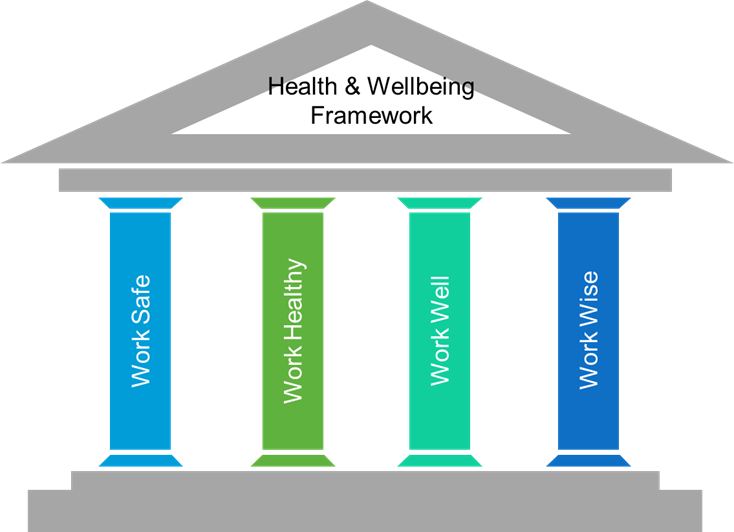The Oberstown Working Well framework is a whole-system approach to addressing psychosocial health and wellbeing. It features supports and resources around four pillars – Work Safe, Work Healthy, Work Well and Work Wise.
Gaining the Ibec KeepWell Mark accreditation has offered external validation of the commitment to health and wellbeing in Oberstown, and recognition in the 2020 and 2022 KeepWell Awards was a great achievement for all the volunteers involved.
Winning the Wellbeing Initiative of the Year 2020 at the Ibec KeepWell Awards, our further shortlisting in three categories in 2022 and our listing among the Top 100 Leaders in Wellbeing each year since 2021 are terrific milestones on our journey as we continue to build our employee health and wellbeing framework. Cara Driscoll, Organisational Psychologist at Oberstown Children Detention Campus outlines the short version of our Working Well story so far.
Developing our approach
In October 2018 we set out to develop a strategic framework that would deliver health and wellbeing benefits for every employee on the campus. We set tight timelines, and by the end of January 2019 a core group of 15 change champions – senior managers, managers and staff members from across the organisation – had devised the Working Well framework that we use today. Working Well has four pillars, each with specific objectives:
Work Safe: ‘all things health and safety’
- Create a safe and healthy working environment.
- Build safe and healthy working systems.
- Build a safe and healthy culture.
Work Healthy: ’all things healthy living’ e.g. diet and lifestyle
- Utilise the resources on Campus to promote a healthy working environment.
- Commit to engaging in healthy initiatives.
- Encourage and support employees to develop and maintain healthy behaviours.
Work Well: is about all things mental health and wellbeing
- Display commitment to a collaborative approach to wellbeing and continue to recognise the challenges within the working environment.
- Continue to provide access to employee supports such as; Line Managers, Employee Assistance Programme, Occupational Health, Peer Support Workers, Campus Support Services, and Training and Education.
- Build awareness regarding physical and emotional wellbeing in self and others.
Work Wise: ‘all things work’ e.g. culture and values
- Create an inclusive team working environment.
- Establish and promote the organisational values.
- Bring the organisational values to life.

We set goals for each pillar in the form of concrete actions to deliver across 2019 and 2020. An early action was to investigate accreditation for our approach to health and wellbeing – we wanted to know how our framework measured up to best practice, and to explore other ideas to enhance our efforts. This is where the Ibec KeepWell Mark came in; we registered our interest and began working with the IBEC team in April 2019.
Compiling evidence
We immediately recognised that the KeepWell approach was a good fit with Working Well. We allocated responsibilities to senior managers and heads of department for each of the eight KeepWell themes – Leadership, Absence Management, Smoke Free, Physical Activity, Health & Safety, Mental Health, Healthy Eating, and Intoxicants. Each theme identified levels of activity, action plans and practices that we needed to have in place if we were to meet the standard. We were already there in some areas – like developments in absence management and being a smoke-free campus – and then there were areas where we needed to develop, such as Physical Activity and Intoxicants.
We agreed actions on all the KeepWell Mark areas, and started compiling the evidence – we had to compile evidence to show what we had done, and were doing, under each theme. For example, in the mental health at work area, we included details of our CISM support, our Peer Support Workers (PSW) team, training of PSWs in mental health first aid, and our commencement of the See Change pledge - National Mental Health Stigma Reduction programme. The process helped us review and develop what we were doing under the Working Well framework during 2019 – from creating policies through to the forums we had set up, such as the new Employee Support Service, and a wide range of other activities.
KeepWell audit and accreditation
By the end of 2019 we felt ready to ask the Ibec KeepWell team to audit us, and they came on site in February 2020. The audit was thorough, with the auditor spending a full day on campus, reviewing our substantial sets of documentation and conducting one-to-one and group meetings to verify/ explore all areas further. They met with Pat Bergin, Director of Oberstown, Damien Hernon, Deputy Director, and with others not directly involved in organising health and wellbeing activities at Oberstown. They wanted to speak with a broad range of employees – the focus of our Working Well approach – to make sure that what we were saying rang true with employees and to show that there was an awareness in the campus outside the Working Well groups directly involved in design and delivery. So they met with groups of managers and employees from a variety of areas across the campus.
We were delighted to learn that we had met the standard for KeepWell Mark accreditation, and it was a great surprise and honour to be shortlisted for the 2020 Ibec KeepWell awards in three categories – Best in class: Mental Health, Wellbeing Initiative of the Year, and Company of the Year: Large. – This gave impetus to our wider wellbeing plan. The post-assessment report helped to hone our Working Well framework and enhanced it by adding a number of key deliverables to the journey we were on.

Comments from the KeepWell Awards judges were also very encouraging: “Staff wellbeing and psychological safety are paramount in stressful work environments, and this is something that Oberstown has prioritised. The initiative our judges wanted to recognise, was the ‘deep listening supervisory sessions’ that are facilitated at group and at one-on-one level to allow staff an opportunity to discuss issues affecting their wellbeing and share best practice. These sessions are a safe place to be open and honest about the impact of work on the individual, and to identify additional supports where needed. This activity promotes collaboration and embeds consistency in management practices across the organisation – the judges were impressed by the high value placed on employee wellbeing in Oberstown.”
Knowing what’s possible and where to go for help
While KeepWell Mark accreditation and our success in the awards is not the focus of our health and wellbeing approach, it was wonderful to be acknowledged for the work that was put in. The group of people who worked on building the four pillars of our Working Well framework all have full-time roles and it is a credit to them that they gave of themselves and were willing to volunteer to be a part of developing wellbeing for all their colleagues in addition to their main responsibilities.
Being in the public sector we operate under specific constraints. We don’t have access to a big budget, we don’t have access to a reward and recognition scheme, so we can’t just give people vouchers or prizes. But the group that help with all the actions in our wellbeing programme have great ideas, they know what is possible and how to make it happen. That is the biggest thing. Given all the constraints, what is possible for wellbeing within our environment?
External supports help us expand what is possible and are a big part of our journey. Ibec have been very supportive, and we work with other organisations that have helped us with our wellbeing journey – including STORM (Skills Training on Risk Management), CISM Network Ireland, SETU and DCU. Each of those organisations have really assisted us when we have reached out to them. They have helped us develop something that is really bespoke for the unique environment of Oberstown. Working with them makes a difference in creating an outward-looking health and wellbeing programme.
But the core strength of our Working Well framework is that it is integral to our work here at Oberstown: in order to help young people with their wellbeing, to deliver best quality care to young people, we need to look after our own wellbeing.
